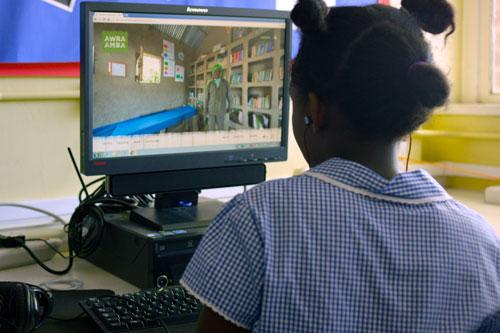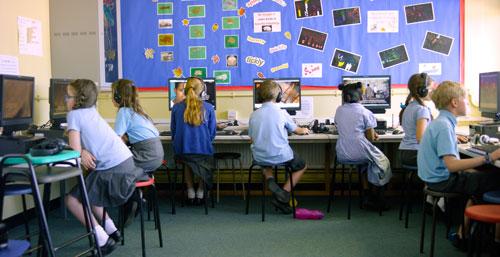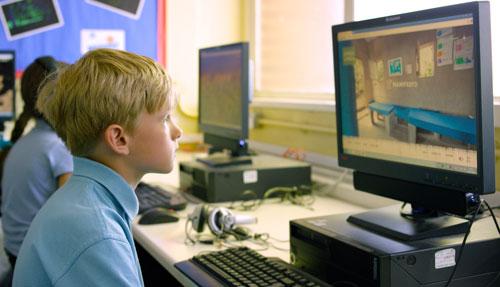“The preliminary results show that a purposefully designed VR environment can significantly improve dyslexic children’s’ reading experience.” – Serdar Ferit and Katri Meriläinen
According to more and more studies, one of the biggest strengths of augmented reality (AR) and virtual reality (VR) is their ability to give students “real world immersive experiences” that could make learning both more memorable and more meaningful. But can virtual reality improve a dyslexic child’s reading experience?
Lyfta was founded in 2016 by award-winning filmmaker couple Serdar Ferit and Paulina Tervo. It is a subscription based digital learning platform which enables learners to explore the world through immersive experiences and personal stories. Computers, films and VR headsets allow students to immerse themselves in other cultures while learning about them, all through an interactive game style platform. Story themes covered include gender equality, global citizenship, democracy and sustainability.
Lyfta is currently used in over 350 schools in the UK, Finland and the United States, providing students with opportunities to explore new places around the world and meet the inspiring human beings who live there. Creative Director and Co-CEO Serdar Ferit believes that “prejudice and discrimination thrive due to ignorance.” When people meet and try to interact with people they don’t know, gradually, “a familiarity is formed and the experience can be “emotional, memorable and multi-sensory.” The organization has also been studying the benefits of their technology for students with dyslexia who find it difficult to read out loud.
The Global Search for Education welcomes Lyfta’s Serdar Ferit and Katri Meriläinen, (Head of Education).

“The Lyfta platform allows both free exploration on the Lyfta globe and guided lessons shared by the teacher.” – Serdar Ferit and Katri Meriläinen
Serdar and Katri, welcome! Could you please share insights from your research with children using your platform and specifically the benefits you’ve identified for dyslexic children.
Based on case studies from numerous users and extensive classroom sessions both instructing children to use Lyfta and observing their experiences of learning through VR, we conclude that children believe that exploring learning content in VR is more intuitive and memorable.
According to teachers, children are able to construct factual connections above their normal level when learning about phenomena in a contextualised environment. Instead of reading about Middle Eastern cuisine, for example, children can join a Middle Eastern style home dinner in VR and explore related articles in that interactive space.
Many special educators are contacting us to report astonishing results on how Lyfta supports and engages their students. We are conducting academic research in collaboration with two Finnish universities to understand the potential of VR for dyslexic children. The preliminary results show that a purposefully designed VR environment can significantly improve dyslexic children’s’ reading experience.
That’s incredible. How do your digital learning environments narrow the “skills gap” and even address the “global citizens gap”?
Lyfta is a completely unique learning solution that uses emerging technologies to support global understanding, empathy, and a sustainable lifestyle.
After extensive research, we identified 50 important skills, values and attitudes that now underpin the learning experiences available on Lyfta. All of our content and learning materials are tagged so that teachers can search for content that is related to (or which clearly exemplifies) particular skills, values and attitudes.
We have worked hard to make Lyfta very accessible. Lyfta’s learning platform is accessed through a web browser or through apps which can be accessed even in places with poor connectivity. Lyfta lessons are also very flexible and can be delivered in classrooms where there is only one computer or device, as well as in classrooms where each child has their own device.

“The teacher can create new lesson plans from scratch, or use or edit ready-made Lyfta lesson plans.” – Serdar Ferit and Katri Meriläinen
Can you show us some video examples of classrooms using the Lyfta platform?
Here are a couple of short videos made at different schools with children using the Lyfta approach:
How much student choice and student voice is built into your program for classrooms? How are teachers using the platform?
The Lyfta platform allows both free exploration on the Lyfta globe and guided lessons (or ‘Quests’) shared by the teacher. The teacher can create new lesson plans from scratch, or use or edit ready-made Lyfta lesson plans. Lyfta lesson plans encourage active learning and creative thinking.

“Lyfta lesson plans encourage active learning and creative thinking.” – Serdar Ferit and Katri Meriläinen
What about the feedback from students and teachers? What are the biggest challenges you’ve faced?
Whenever we’ve collected feedback from students, and we do this frequently, 100% of them have expressed a positive impression of Lyfta. We’ve worked with hundreds and hundreds of children from schools across the UK and Finland.
Teachers keep amazing us by sharing stories of how their students focus better, gain new insights, and engage in in-depth discussions with each other when they work on Lyfta.
How are you planning to build/develop Lyfta in the next 10 years?
We currently have 25 immersive storyworlds, or digital learning environments with interactive content. We’re adding new storyworlds all the time, and target to have at least one story from every single country in the world by 2022.
Let’s say a teacher wants to implement your program. How does one get started?
This varies a bit from country to country, as we have somewhat different distribution models. If a US teacher wants to have Lyfta, we can be contacted directly by sending us a message on our website.
For more information on Lyfta.

C. M. Rubin with Serdar Ferit and Katri Meriläinen